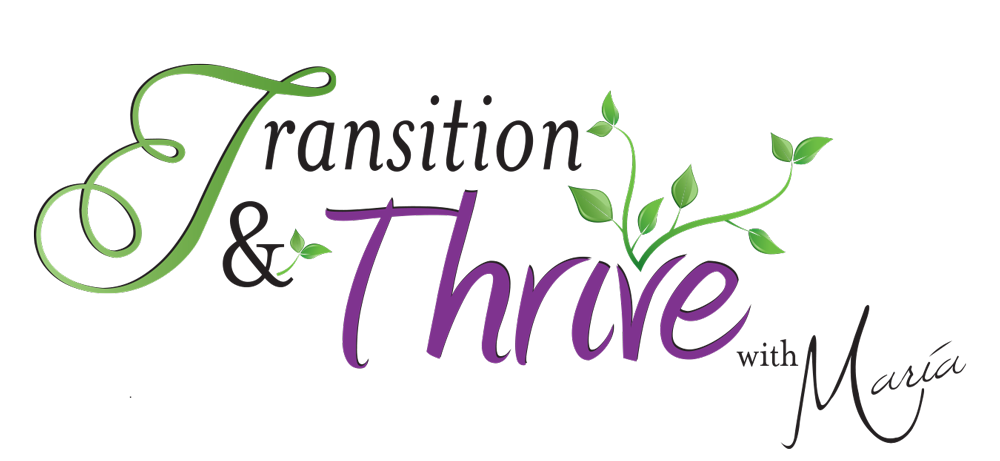Working through loss and grief can be one of the most difficult and challenging times in this human experience.
The grief we feel when we lose someone we’re close to is deep, and it’s different depending upon the nature of our relationship. Through my own experience, and those of my family, friends, and clients, I’ve learned that every one of the losses in our lives takes a different toll.
The loss of parents is different than the loss of siblings … than the loss of extended family. The loss of a spouse is different than all of those. And when we lose our pets, it is a special kind of loss.
And then there are the losses that many people think we should be able to get over more quickly because we’ve lost “a thing” rather than someone. Yet we suffer the loss nonetheless when we grieve the loss of a career or a business failure, or a precious passion that is taken away because we’re too young to protect it. [Excerpted from my book Upside Down to Right Side Up: Turning Transition into Triumph, Chapter 8: Loss & Grief]
The Situation Loss Creates
When we lose someone or something precious in our lives, we can feel as though a piece of our identity is missing. Who am I now that I’m no longer a daughter? Or a wife? A career woman? A caregiver?
The truth is, those identities are still with us—always. But they are forever changed.
I like to think our losses add layers to our being. Those layers accumulate. Some are smooth and shiny, while others are rough and ragged. There are pieces of the old you still there, as you build new pieces, and the new layers add texture and wisdom to your life. If you allow them to form.
It isn’t easy and moving through loss and grief is a process. Here are a few ideas on how you can make some headway.
One Moment at a Time
Don’t try to tackle it all at once. Take one step at the moment. That step may be to allow yourself to cry like a baby. You may need to attend to a task that requires your attention. Or, you may need some space, so you decide to take a walk. Take one thing at a time so you don’t feel overwhelmed by all that lies ahead.
Grieving is Normal
There is nothing wrong with you. You’re not going crazy. You hurt deep inside where you can’t reach. Grief does not operate in a linear fashion. Know that you will be okay once you give yourself time to feel the emotions, let them ebb and flow like the ocean tide, and learn to process what you feel in a way that feels right for you. You may need some help with this, so don’t be ashamed to reach out to someone you trust.
Talk About Your Loss
The power of talking cannot be underestimated. Having conversations about your loved one, with friends and family or a coach or counselor, helps to get the thoughts out of your head. Talk about the facets of your relationship, the good and the bad, and the emotions you feel. If you leave them bottled up inside, it’s harder to shift your attitude about them. This shift will help you express yourself more freely and allow the feelings to be released. There is relief in that release.
Delay Decisions
Sometimes, with major loss and the grief that follows, you are not thinking clearly. You may feel confused. In this state of moving through loss and grief, you are likely to make decisions that are not sound, or that you wish you had more time to think about. Give yourself that time. Consult with others you trust if decisions must be made immediately, so you benefit from the clarity and objectivity they can bring.
Be Kind to Yourself
You hear a lot about self-care, I know. I talk about it all the time with my clients, and I write about it. And self-care isn’t easy to do when you’re working through loss and grief. Yet it is essential if you are going to get through this time in one piece, without losing yourself. Self-care takes different forms for everyone. Figure out what form it takes for you and do more of that. As your cup is drained by the energy spent grieving, you must refill it. Truly, only you can decide how best to take care of you.
Accept You Won’t Have All the Answers
Especially when the loss seems senseless, you may be asking Why me? Or, why her? These are questions without answers. Chasing those answers will leave you drained with nothing left. Not being in control can be frustrating. Change is always difficult—even more so when there is loss with grief attached to it. Making peace with the fact that some things are out of your control to change is a good way to position yourself for moving through it. Have faith and hope. These will help you to find the courage to work through the loss and grief.
There Will Be Dark Days
As more time goes by and you put distance between you and the initial shock of the loss, you will experience some moments of joy and happiness, like before. Don’t feel guilty about them. Allow them to soak into your heart and lift you. Because those moments of good feelings will come and go fleetingly at first. You’ll welcome more of them as time passes and then, from out of the blue, there will be days when a wave of emotion takes you down. All normal. Grief makes its own rules. And, those rules are unique to each of us in terms of how long grief sticks around. You’re not alone.
Create a Ritual
Each time someone I love passes it gives me an opportunity to dedicate something to them. For each parent, I planted a tree. I get to sit under those trees and have a chat, which brings me comfort. For one brother, I bought something to wear to keep him near to my heart. For another brother, I took one of the wooden boxes he made for me and I put it on my bureau, where I store my jewelry each night so I can touch something he touched. For some of my pets, I put ornaments in my garden. I feel closer to each of them every day because of these rituals. What can you do to keep your connection to your loved ones close to your heart?
Find the Gratitude
Rather than feel “lost,” choose to feel found. Choose to “have” rather than to lose. It’s a simple (yet not easy) mindset shift. Make a choice to find the blessings in knowing your loved one, warts, wrinkles and all. This, above all else, will help you work through the loss and grief in your life. Make a list of all the good, the bad and the ugly of your loved one. Add one thing about each item on your list that you are grateful for, despite the wart. It may be as simple as a lesson you learned, or a precious moment you shared. If other members of your family or friends are struggling too, engage them in this exercise with you. Finding gratitude as a community is very powerful. Replacing the sense of loss with a feeling of gratefulness begins to fill the hole left in your heart.
Making Sense of Moving through Loss and Grief
With grief of every kind, we must allow the emotions to come and flow so we can ultimately let them go. This takes time. The time it takes cannot be dictated by anyone but you. The ebb and flow of those emotions can feel gentle or turbulent. It can send you into a tailspin or draw you inward to reflect. It may leave you feeling relieved and ready to move on or it can hold you in its grip for months or years at a time.
Everyone is different. Every loss is different. Be gentle with yourself. Allow time to feel the loss, to experience how it changes your life and to heal, so you can find your way forward—in your own time, in your own way.
During this time, you may feel despondent or depressed. You may seclude yourself and prefer to be alone. When something major happens in my life, I tend to spend some time with the covers pulled over my head. I don’t talk much because I’m processing things in my head and reconciling the hurt in my heart.
There’s nothing wrong with that unless the thoughts in your head take you down a rabbit hole that you can’t crawl out of.
I’ve learned to reach out and talk about it with people I trust, who will not judge me.
And sometimes I write—just write and write and write—about how I’m feeling and what I’m thinking. When I voice my thoughts and feelings, whether out loud so someone can hear me, or silently as I write, they don’t feel so scary.
If this happens to you, think about who in your world can listen, allow you to cry and pour out your feelings, while they pour back into you some love and comfort.
Stepping onto Your Bridge
When life-changing moments flip the world upside down, I create a bridge for women so they can turn chaos into calm, build resilience and learn to live a life guided by their own values and vision. If you’re ready to take the first step onto your bridge and explore how change can impact you and how to move through it with more dignity and grace, get my free ebook From Darkness to Light: Learning to Adapt to Change and Move Through Transition.

